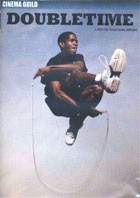
Doubletime 2007
Distributed by Cinema Guild, 115 West 30th Street, Suite 800, New York, NY 10001; 212-685-6242
Produced by Andrea Meditch, Alexandra Johnes, Stephanie Johnes
Directed by Stephanie Johnes
DVD, color, 82 min.
All ages
Rope Skipping, Health Sciences, Competitions
Date Entered: 04/07/2011
Reviewed by Christopher Lewis, American University Library, American UniversityDoubletime is a competition documentary that follows two teams, the Bouncing Bulldogs and the Double Dutch Forces, as they prepare for and compete in a rope skipping championship at the Apollo Theater in Harlem. The Bouncing Bulldogs are a predominantly white middle-class rope skipping team from Chapel Hill, NC. Their expertise is in speed jumping and freestyle tricks. The Double Dutch Forces are a predominantly African-American economically-disadvantaged Double Dutch crew from Columbia, SC. Double Dutch requires two rope handlers turning the ropes in an egg beater fashion for the jumpers. The members of both teams are exceptionally talented and thrilling to watch. Each team has standout performers and inspiring leaders and their stories are the primary focus of the film. Watching these individuals in action is akin to seeing the best gymnasts or break dancers perform. They have skills that are almost unimaginable such as jumping at a pace of 300 jumps per minute, jumping while sitting on the floor, and dozens of other between- the-ropes moves.
Along the way one learns about the genesis of competitive rope jumping in the 1970s. It sprang up almost simultaneously in two distinct forms, single rope and double rope (Double Dutch), led by two motivated individuals, Richard Cendali and Dave Walker, in two separate parts of the US. The early success of Double Dutch in New York City was a factor in the two continuing down separate paths. The annual competition at the Apollo is called fusion freestyle and is an evolved version of the Double Dutch contests. It goes well beyond rope skipping now though. It’s as much about showmanship, dancing, and style as it is about skills. Part of the challenge for the Bouncing Bulldogs is to learn how to add some pizzazz to their routine before the competition in order to even have a chance.
An important aspect of the sport is the influence of the Japanese teams who are mostly given short shrift in the film. In recent years, they have begun dominating the competition and introducing mind-boggling tricks and techniques. Otherwise the film is ambitious in its reach and successfully introduces many aspects of the sport to the viewer with its use of archival footage.
Spoiler alert: Unlike other films in the competition genre such as Hoop Dreams and Spellbound, the ending of this film is a little anti-climactic. Neither of the featured teams wins in any of the categories of competition though they seem content with their performances and celebrate the moment nonetheless.
The film seems to have just recently been released on DVD though it has a copyright date of 2007 and the competition at the Apollo was held in 2004. Not that it matters much because its appeal is almost timeless. The DVD is recommended for general collections. High school and middle school audiences will love it for its music, sportsmanship, artistry, and mad skills and so will you.